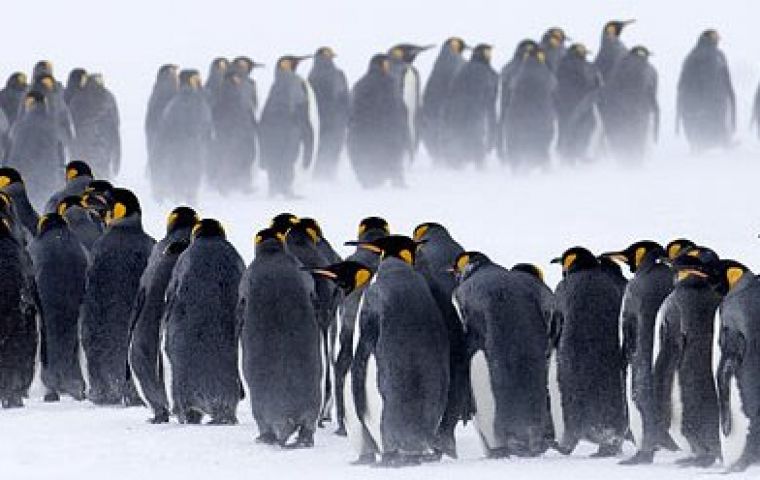MercoPress. South Atlantic News Agency
Satellite technology reveals double emperor penguin numbers in Antarctica
 The team analyzed 44 emperor penguin colonies around the coast of Antarctica, seven previously unknown
The team analyzed 44 emperor penguin colonies around the coast of Antarctica, seven previously unknown A new study using satellite mapping technology reveals there are twice as many emperor penguins in Antarctica than was previously thought. The results provide an important benchmark for monitoring the impact of environmental change on the population of this iconic bird.
Reporting this week in the journal PLoS ONE, an international team of scientists describe how they used Very High Resolution (VHR) satellite images to estimate the number of penguins at each colony around the coastline of Antarctica.
Using a technique known as pan-sharpening to increase the resolution of the satellite imagery, the science teams were able to differentiate between birds, ice, shadow and penguin poo (guano).
They then used ground counts and aerial photography to calibrate the analysis. These birds breed in areas that are very difficult to study because they are remote and often inaccessible with temperatures as low as - 50°C (- 58 degrees Fahrenheit).
Lead author and geographer Peter Fretwell at British Antarctic Survey (BAS) which is funded by the UK’s Natural Environment Research Council (NERC) explains, “We are delighted to be able to locate and identify such a large number of emperor penguins. We counted 595,000 birds, which is almost double the previous estimates of 270,000/350,000 birds. This is the first comprehensive census of a species taken from space.”
On the ice, emperor penguins with their black and white plumage stand out against the snow and colonies are clearly visible on satellite imagery. This allowed the team to analyze 44 emperor penguin colonies around the coast of Antarctica, with seven previously unknown.
“The methods we used are an enormous step forward in Antarctic ecology because we can conduct research safely and efficiently with little environmental impact, and determine estimates of an entire penguin population, said co-author Michelle LaRue from the University of Minnesota and funded by the U.S. National Science Foundation. “The implications of this study are far-reaching: we now have a cost-effective way to apply our methods to other poorly-understood species in the Antarctic, to strengthen on-going field research, and to provide accurate information for international conservation efforts.”
BAS biologist Dr Phil Trathan, and co-author, noted, “Current research suggests that emperor penguin colonies will be seriously affected by climate change. An accurate continent-wide census that can be easily repeated on a regular basis will help us monitor more accurately the impacts of future change on this iconic species.”
Scientists are concerned that in some regions of Antarctica, earlier spring warming is leading to loss of sea ice habitat for emperor penguins, making their northerly colonies more vulnerable to further climate change.
Dr Trathan continued, “Whilst current research leads us to expect important declines in the number of emperor penguins over the next century, the effects of warming around Antarctica are regional and uneven. In the future we anticipate that the more southerly colonies should remain, making these important sites for further research and protection.”
This research is a collaboration between British Antarctic Survey, University of Minnesota/National Science Foundation, Scripps Institution of Oceanography and the Australian Antarctic Division.




Top Comments
Disclaimer & comment rules-

Read all commentsIf success of breeding colonies is inversely correlated with surface temperatures (etc), the decline will be in the 'warming' West and Peninsular Antarctica (including the UK sector) .
Apr 14th, 2012 - 01:10 pm 0http://www.giss.nasa.gov/research/news/20090121/
Other areas should suffer less or remain unchallenged.
Commenting for this story is now closed.
If you have a Facebook account, become a fan and comment on our Facebook Page!